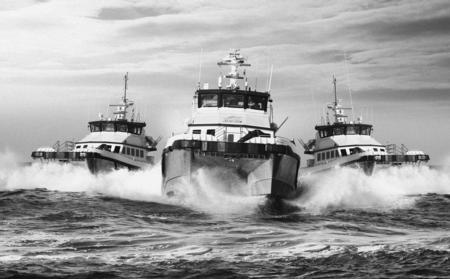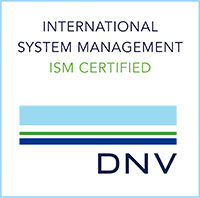


Cowes, 30 June: Class-leading OESV operator Seacat Services (Seacat) today sets the standard for low-emissions offshore wind support as the first business to adopt the Carbon Management Plan; a first of its kind emissions reduction strategy introduced by new maritime sustainability consultancy, Cedar Marine.
The offshore wind sector has suffered scepticism in recent weeks around the environmental performance of its supply chain and support networks. This includes high emissions levels generated by its supporting fleet of OESVs, which may lead to question marks over the effectiveness of the wind sector as a true zero-carbon energy solution. As a cornerstone of global efforts to reduce energy emissions, it is crucial for the future viability of offshore wind that its own operational emissions profile is controlled and improved.
In joining Cedar Marine’s pioneering carbon reduction initiative, Seacat calls on the renewable and offshore support industries to hold themselves to higher standards, and recognise the importance of driving down their environmental impact to better facilitate a sustainable energy transition.
The Carbon Management Plan enables organisations to monitor their performance and commit to comply with developing industry and regulatory standards for decarbonisation, as well as pursue their own sustainable goals, while also maintaining commercial success and operational efficiency. In signing up to the Carbon Management Plan, Seacat has committed to;
· The measurement and analysis of its baseline carbon footprint;
· the generation of a dedicated Carbon Management Plan;
· progress tracking and quarterly data reporting against its goals; and
· annual review of its Carbon Management Plan based on its progress.
In practice, the Plan requires Seacat to commit to a sustained period of operational change, R&D, and significant investments to bring down its emissions. Seacat has already begun to fulfil these commitments through a number of initiatives, such as using alternative fuelling solutions for its fleet. The company recently fuelled its CTV Seacat Enterprise with HVO30 for its return journey and first operational days at Triton Knoll Offshore Wind Farm, reducing the vessel’s CO2 footprint.
Speaking on its first-mover status, Ian Baylis, Managing Director at Seacat Services, said: “Offshore wind is a critical component in building a zero emissions future, and as its supporters we have a clear responsibility to uphold the sector, operationally and environmentally, as it drives the transition to zero emissions. For us, achieving this goal requires a complete overhaul in how we assess, monitor, and implement carbon reduction solutions, without compromising the ability to satisfy the operational needs of our offshore wind customers.
“Success here is not a matter of adopting lower emissions fuels and technologies in isolation; it’s about implementing measured pathways of continuous emissions improvements, in line with an established goal. Cedar Marine is the perfect partner to help us set, track and achieve our sustainable ambitions, and lead the charge for the evolution of a commercially successful and environmentally conscious offshore support sector.”
Established to supply maritime organisations with the tools they need to realise an environmentally sustainable future, Cedar Marine formally launches today as an industry partner to provide technical and commercial support to maritime owners, managers and operators across a full spectrum of services, including vessel build and operation, compliance, and environmental performance. The organisation is headed by Owen Preece, a certified marine surveyor and naval architect with almost ten years’ experience, and staffed by highly trained and experienced marine surveyors, authorised by UK Flag approved certifying authorities MECAL and SCMS.
Speaking on the launch of the business, Owen said: “The call for the offshore wind sector to improve and uphold its sustainability is rising, but sustainability itself takes many, often contradictory forms, from climate concerns to business continuity and optimised assets. We understand the difficulties the OESV sector faces is determining its most suitable pathways to fulfilling its operational and environmental commitments to its offshore wind customers, and our carbon consultancy is here to advise and accelerate the trajectory of sustainable improvement from OESVs, operationally and environmentally, to support the growth of offshore wind.”

